|
Part 2 – Shanghai Express & Blonde Venus
I have a fondness for films that take place primarily on board a train during the course of a usually fateful journey. Such tales often begin by introducing us to individual passengers as they arrive at the departure station and settle in to their assigned carriages, and end with the triumphant arrival of the train at the intended destination, concluding a journey that has been littered with adventure, danger and intrigue. Unsurprisingly, perhaps, the film that first hooked me on this subgenre was Hitchcock's 1938 The Lady Vanishes. Since then I've been entertained by the likes of Satyajit Ray's The Hero (1966), Andrei Konchalovsky's Runaway Train (1985) and, of course, Sidney Lumet's star-studded Agatha Christie adaptation, Murder on the Orient Express (1974). I even remember rather enjoying the 1979 made-for-TV action flick Disaster on the Coastliner, despite the fact that this particular strand of the disaster movie had been wonderfully parodied three years earlier by James Frawley's hilarious The Big Bus. Yet six years before Hitchcock's fondly remembered hit, Josef von Sternberg effectively drew up the template for all such works to follow with a film that still ranks as the one of the best this subgenre has to offer.
It begins as so many subsequent such films would do with brief introductions to some of those who will be riding the titular train, which in this case is travelling from Peiping (now Peking) to Shanghai during the civil war in China in 1931. Although, a tad surprisingly, not the first to appear, Dietrich's arrival, dressed as she is in a flamboyant and feathered black dress that gives her the appearance of a seductive raven, is shot in a way that makes it clear that she's going to play a significant role in the drama that follows. Here she plays successful courtesan Shanghai Lily, having fallen into this lifestyle five years ago when her romance with British army Captain Donald "Doc" Harvey (Clive Brook) ended after her attempt to make him jealous backfired. By chance, Harvey is on the same train and recognises Lily, and is startled to discover that she is now the country's most notorious 'coaster', a nickname, a fellow officer informs him, for "a woman who lives by her wits along the China coast." Other occupants of the first class compartments include Mr. Carmichael (Lawrence Grant), a Christian missionary who has the bluff intolerance of someone who spreads the good word by yelling angrily at the locals; cheerful gambler Sam Salt (the gravelly-voiced Eugene Pallette); elderly, unhappy and physically fragile German Eric Baum (Gustav von Seyffertitz, the Secret Service Chief from Dishonored); upbeat and polite French officer Major Lenard (Emile Chautard), who speaks no English; prissy English boarding house owner Mrs. Haggerty (Louise Closser Hale); Chinese fellow coaster Hui Fei (Anna May Wong); and portly Eurasian Henry Chang (Warner Oland), who's clearly up to something, but exactly what is not immediately clear.
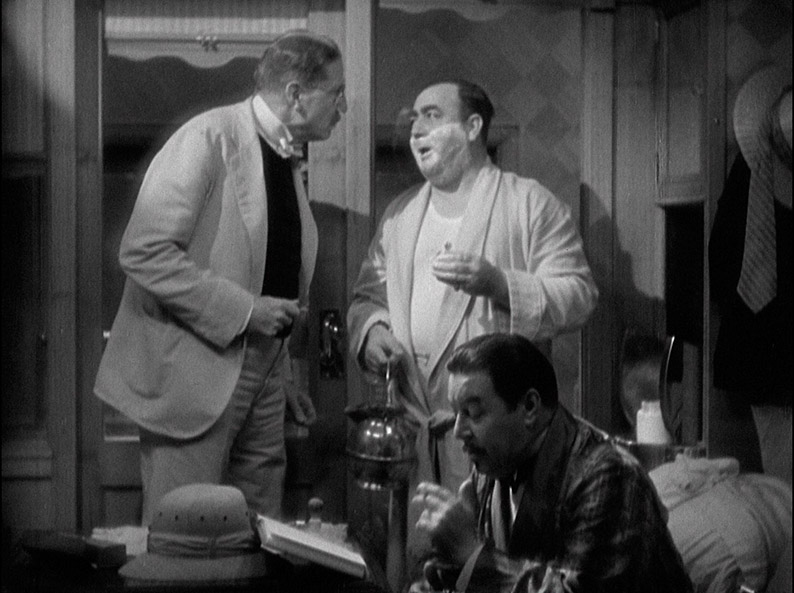
One thing that quickly struck me is that most of the white western characters come across as bigots, dismissive of the Chinese as "having no future," as one passenger puts it, and particularly contemptuous of Lily and Hui, who end up sharing a compartment after Carmichael refuses to occupy train space with Hui, or as he puts it, "a woman like that." What an absolute arse. And sorry, while I do try not to get all fan boy about female characters and actors in movies, the prospect of sharing a train compartment with Marlene Dietrich and Anna May Wong at their most bewitching and beautiful is one that would have kept my younger self in happy dreams for a good year or two. Mrs. Haggerty is elderly, English and entitled and so is by default an intolerant twerp, but she is not exactly balanced by the resentful Harvey, who later gets the chance to demonstrate what an absolute prig he is after Lily makes a decision that could see her sacrifice any hope of happiness and freedom and he's too pissed off at what he wrongly perceives as slutty behaviour on her part to realise that she did it purely to protect him. By this point I wasn't willing him to see the light, but secretly hoping that Lily would just dump him and head off for a more rewarding life with Hui instead. Possibly the most interesting and simultaneously irritating character on this score is Carmichael, whose bullish intolerance of Lily melts away after he sees her praying for Harvey's safety, which transforms the hypocritical git into a champion for her faith in the man she still loves and then sees him bawl Harvey out for being a blockhead.
As with The Lady Vanishes, the politics of the time and place are at the root of the disruptions to the journey and drive the story forward, which is signalled early on when the train makes its first stop and the passengers are forced to disembark so that government troops can root out an on-board revolutionary. It's here that we get our first sign that Chang is involved in the civil war on one side or the other in an official capacity. This is later confirmed when the train is brought to a halt at a station that the revolutionaries have overtaken, where the passengers are interviewed individually (and in one case horribly tortured) by a now uniformed Chang in the search for a suitable hostage to trade for the earlier arrested man.
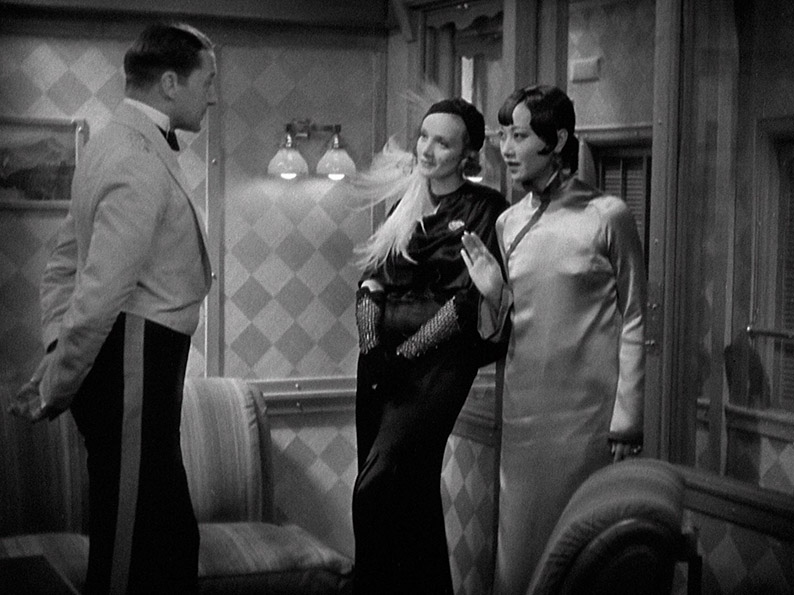
As with all such tales worth their salt, the real strength of Shanghai Express lies in its characters and their interplay, and while Dietrich once again shines in every scene she appears in, the supporting characters are also well cast and distinctly defined. Sometimes it's an almost offhand action that helps shape the character, such as the huffy annoyance expressed by Carmichael and Haggerty for each other when buying their tickets, or Chang distractedly pushing a porter back when he tries to board the train because he doesn't see why he should move to let him pass. Elsewhere so much is subtly communicated through looks and behaviour, notably in the unspoken solidarity between Lily and Hui, who never introduce themselves to each other or make mention of their trade, but head off to the restaurant car together like they've known each other for years. I can't say for sure whether a running gag in which Salt misinterprets every French word cheerfully uttered to him by Major Lenard as an insult was an intended dig at white American intolerance, but given the pops taken at bigoted pomposity elsewhere, I like to think it was.
Given the year of production it's perhaps a bit unfair to get into a discussion about the movie trope in which white western characters are menaced by foreign others in what was then still likely regarded by the local audience as a strange land. And while the film's vision of China is the fantasy creation by a director who at this point had never been there (he would later visit and fall in love with the Far East), I'd still argue that Shanghai Express does better by its multi-racial cast than a good many other Hollywood films of the era. The half-Chinese Chang may ultimately be the bad guy (and he's not half-Chinese – Walter Orland was Swiss), but this is balanced by the always sympathetic and strong-willed Hui, who is not the target of bigotry for her race but for her profession. When French or Chinese is spoken it is not translated for the audience unless the multilingual Lily or Hui are asked to assist, and a sizeable number of the Chinese supporting characters are played by Chinese-American actors or extras. There are a few exceptions, but they're rarely on screen long enough for this to register, at least if you ignore the voice of the station ticket seller, who sounds as if he's on a job exchange visit from New York's Grand Central Station. Where the film does pay slight lip service to the moralistic tradition (hop ahead to the next paragraph to avoid a biggish spoiler) is in the differing fates that befall Lily and Hui at Chang's hands, with Lily escaping the rape that Hui was clearly subjected to precisely because of the vengeful Hui's intervention, which intriguingly was partly facilitated by an earlier exchange between Lily and Hui over the very weapon she uses to secure Lily's freedom. As with the previous titles in this set, there's so much layering here that it would take me all week to pick it apart.
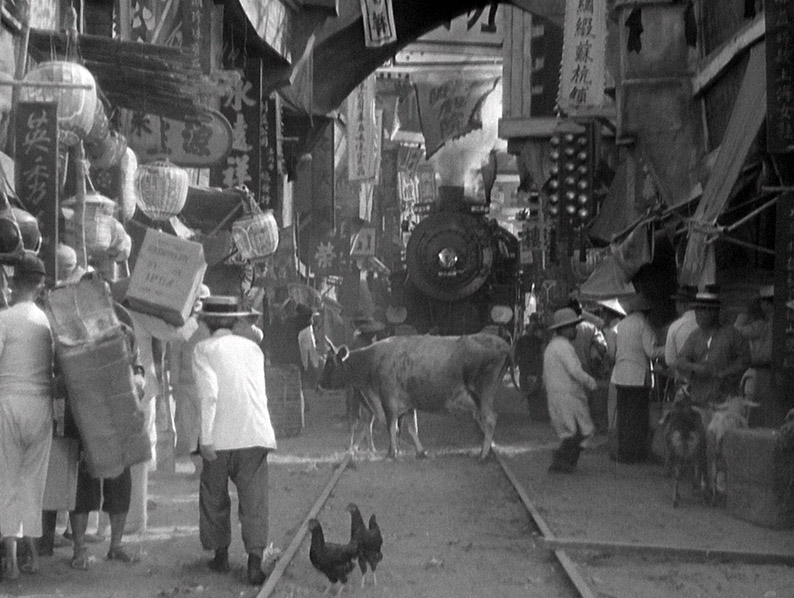
Again, von Sternberg is in complete command of his craft, and in the use of real trains for the exterior shots (real Californian trains around which sets were built, but the illusion is surprisingly convincing) he gives the impression of a film that is far larger in scope than it actually is. This sense that we are on location is established early in an astonishing shot of the train edging its way down tracks that run improbably through a busy market street, a sequence whose set design, attention to detail and coordination of action genuinely prompted by jaw to fly downwards and my eyes to bulge in disbelief. Just seconds later there's a lovely little moment when the train passes fruit stalls and soldiers plunge their bayonetted rifles into the baskets to snag apples, one that's almost lost in a dissolve but that still registers because – hell – I've just never seen that in a movie before. It concludes more conventionally than the previous two films, but given the fate that I was becoming convinced would befall at least one of the principal characters, I was happy enough with how things eventually turned out, even if it did require a jarringly sudden attitude switch on another character's part. This matters not. The journey's over and I thoroughly enjoyed the ride.
In the suggestively titled Blonde Venus, Marlene Dietrich plays a devoted wife and mother. Nothing there that might offend the uptight moral guardians of Hays Code morals, then. You think so? Well let's start with the opening scene, in which a group of male students from America on a hiking holiday in rural Germany stumble across a company of young female theatre performers swimming naked in a lake. And yes, they really are naked. Two years later, this sequence would have been severely cut back or possibly banned altogether (it apparently was on some prints). Yet it's here that Englishman Ned Faraday (Herbert Marshall) first meets the delectable Helen (Marlene Dietrich). From the water she irritably asks him to leave so that she and her friends can dress without being gawked at, but the self-assured Ned makes a play of staying put and even asks Helen if she fancies a date after tonight's show. She flatly turns him down and swims off in frustration, and in a brilliant associative dissolve the water splashes kicked up by the women as they swim off is transformed into the splashing of bath water by the legs of a young boy. The kid's name is Johnny (Dickie Moore) and he's being bathed by Helen. Not, it turns out, in her hometown in Germany but some years later in an apartment in America that she shares with Ned, to whom she is now married. There are no title cards or captions to sketch out the details, we just work out what has happened from the juxtaposition of these two sequences and the scenes that immediately follow. Now that's filmmaking.
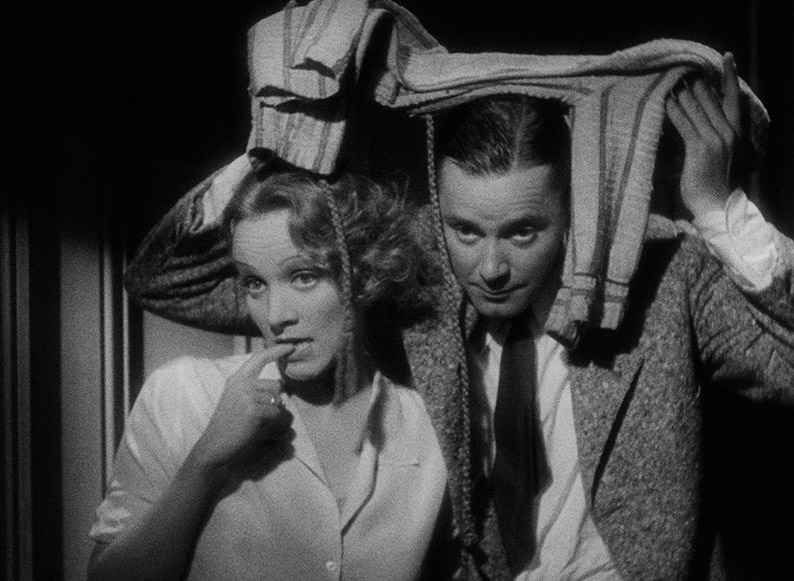
Where others might spend time with Ned and Helen so that we can become acquainted with the family as it now is, von Sternberg and credited screenwriters Jules Furthman and S.K. Lauren cut right to the chase, and our first encounter with Ned comes when he walks into a doctor's office and offers to sell him his body. It turns out that he's dying of radium poisoning contracted through his work as a commercial chemist and he estimates he has only a year at the most to live. Expectations that he is doing all this on the sly to avoid upsetting his family are quickly quashed when he confirms that his wife is aware of his condition and prognosis. The doctor can't help him but knows of a specialist in Germany named Holzapfel who has developed a curative process that has shown some success in cases like Ned's. It turns out that Holzapfel was one of Ned's professors when he was a student in Germany, but the doctor estimates the cost of the treatment will be approximately $1,500, which my handy inflation calculator estimates would be about $28,000 in today's money. But Ned is broke, which is why came looking to sell his body in the first place. It's only when he returns home from this fateful appointment that we learn how he and Helen first got together, which is told as a bedtime story to Johnny. We'll be hearing that tale again before the film is over.
When prompted by Helen, Ned confirms that he wouldn't need all the money at once and that $300 would get him to Germany, which Helen assured him she could earn by returning to the stage. Ned, of course, is dead set against it. What was it about male breadwinner pride that even when a man is dying he finds the idea of his wife going out to work so outrageous? Or maybe it's just that ludicrous old prejudice that equates the notion of a woman going on the stage with prostitution? But Helen persuades him anyway and in no time is battling with other female hopefuls for a shot in any production that's going. Her beauty sees her picked out from the crowd by pushy agent Ben Smith (Gene Morgan), who after changing Helen's surname from Faraday to Jones does a swift job of browbeating sleazy club manager O'Connor (played by Robert Emmett O'Connor – a coincidence, perhaps?) into taking her on and paying a decent wage. While dressing backstage Helen learns from fellow performer Taxi Belle Hooper (Rita La Roy) that her expensive bracelet was a gift from wealthy club regular Nick Townsend (a young Cary Grant) after he took a shine to her. When Taxi sits at Nick's table during Helen's debut number (we'll get to that in a minute), however, he seems a lot more interested in Helen than her and in no time at all is backstage chatting her up. The wily Helen coyly plays along, and in the twinkle of a dissolve Nick is writing her a cheque for the hoped-for $300. Intriguingly, we never do learn precisely what she did or didn't do to secure it. Ned thus departs to Germany to seek the treatment that may save his life, but Nick isn't ready to give up on Helen just yet and she soon finds herself enjoying his company and the lifestyle that comes with it.
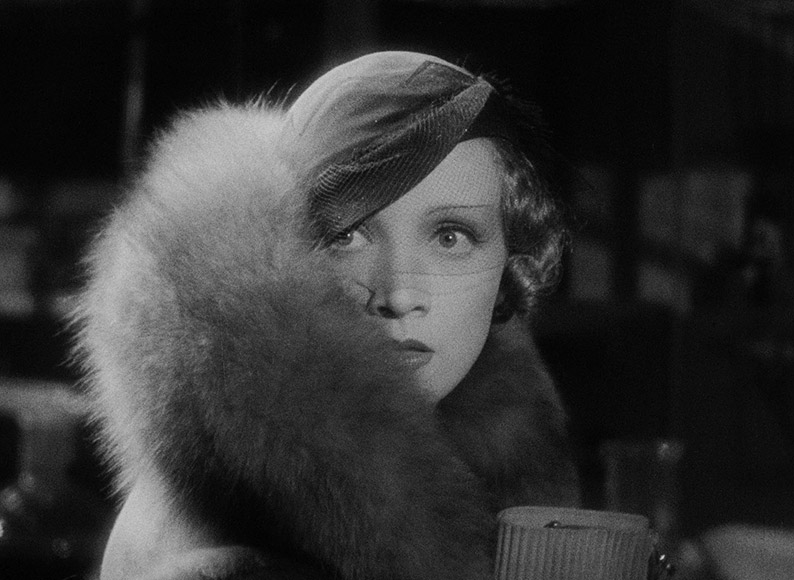
If there's an inevitability to how some of this plays out, that all changes when Ned returns home to find the family apartment empty and a letter he sent to Helen informing her of his arrival sitting unopened. I'm not about to get into the specifics of how things play out from here, but there are a fair few kicks against what became tradition and a few moments when I wasn't quite sure which person to root for. This bond with the characters is down in no small part to two excellent lead performances from Dietrich – who really gets the chance to show the range of her acting mettle here – and Herbert Marshall, who even at his most hostile and seemingly unreasonable feels authentically torn apart by his anger and pain, a very different story to Clive Brook's performance as the petulant Doc Harvey in Shanghai Express. And if the first half of the film is driven by what a strong-willed woman would do to help the man she loves, as Helen and Johnny hit the road with Ned in dogged pursuit in the second, it becomes a study of how a relationship can collapse into a battleground where a child becomes the spoils. Cary Grant, meanwhile, had yet to hit superstar status (this was only his fifth credited film role) and is essentially a supporting player, but his natural charm and suave looks are put to good use here. As Nick he never comes across as sleazy or overly manipulative, but in an echo of the love triangle in Morocco, he ultimately still fulfils the role of wealthy disruptor, one whose money buys hope for a family it is then instrumental in tearing apart.
Although working with Stagecoach cinematographer Bert Glennon for the third time (he previously shot the silent hits Underworld and The Last Command for the director), Sternberg's stamp is all over the lighting, which makes typically evocative use of darkness and pools of light, with characters repeatedly (and sometimes expressionistically) placed in darkness or moving into or out of shadow. There's also an added bonus in the shape of three Dietrich musical numbers, the third of which harks back to both Morocco and The Blue Angel by costuming Helen in a white top hat and a tailcoat with glittering lapels. The first has not aged quite as elegantly, opening as it does with a tribe of blacked-up, wigged and face-painted showgirls playing a 30s western concept of African warriors and leading a gorilla-suited figure that turns out to be the very white Helen. The performance of the song that follows, however, is really something, and resolutely confirms the transformation of the housewife Helen into the Blonde Venus of the title.
Despite the expressionistic elements and the oddness of casting the then 6-year-old Dickie Moore in a role that I suspect was intended to be interpreted as younger than it appears (Johnny certainly looks too old to be still sleeping in a cot), the contemporary American setting the story of family breakup make Blonde Venus the most reality-grounded of the films in this set. A melodrama it may be, but one shot through a distinctly noir-tinted lens. The gripping story development, the beautifully controlled direction (facial close-ups are used to powerful effect here) and the strength of the performances make this – for me at least – one the most emotionally truthful and affecting films in this collection.
|